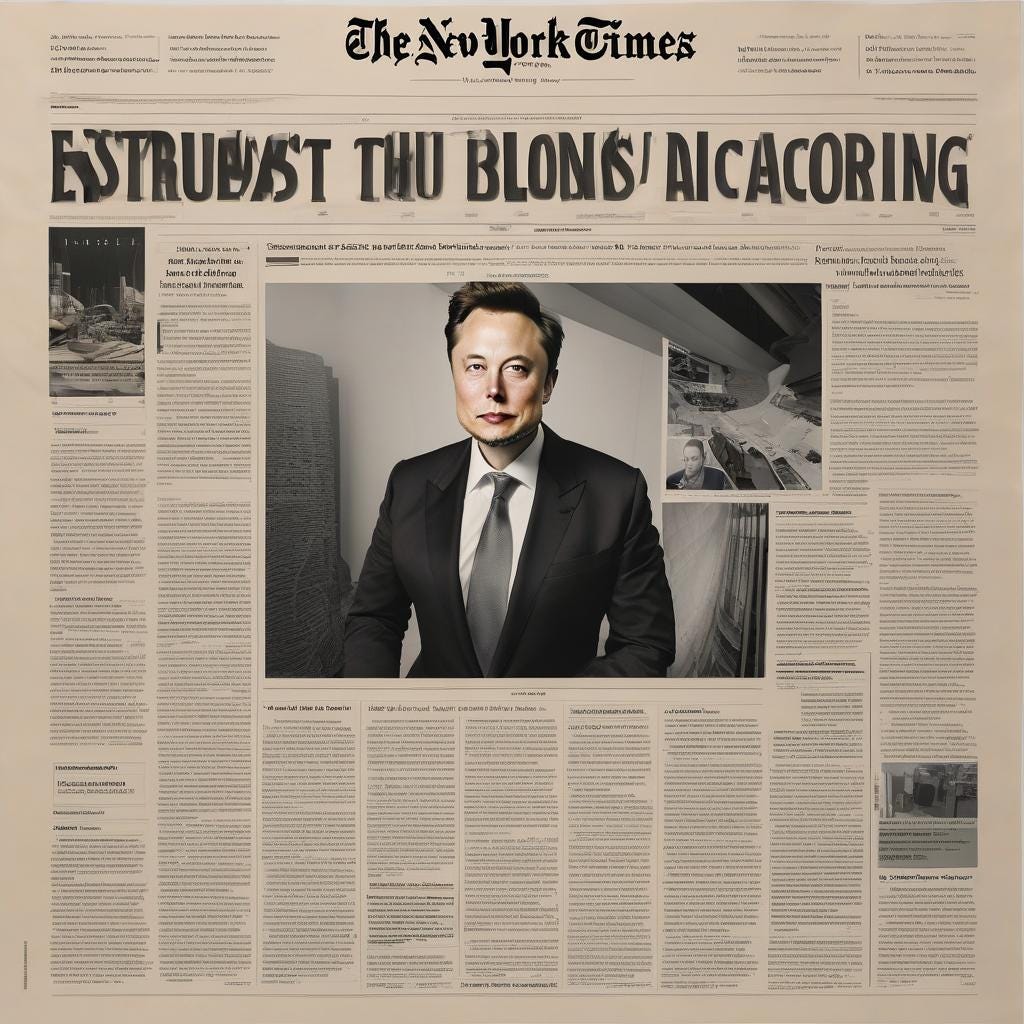Michelle Goldberg's Accidental Masterclass on Book-promotion
New York Times columnist Michelle Goldberg writes about a new book, chronicling Elon Musk's destruction of Twitter, and models what might be the best-possible promotion of a new release.
Book promotion is tricky. The gold standard for an author is probably a presidential endorsement (Bill Clinton’s endorsement of Walter Mosley’s Devil in a Blue Dress changed Mosley’s life, Barack Obama’s endorsement of S.A. Cosby’s Razorblade Tears still dizzies his Twitter feed); second to that, being chosen for a celebrity book club. 20 years ago “celebrity book club” meant Oprah’s, but now there’s Reese Witherspoon’s, Mindy Kaling’s, Dakota Johnson’s…
Then there’s influencers. BookTube’s a valuable platform, BookTok…
Conventional advertising doesn’t seem to work anymore. Billboards aren’t plausible when most of the population doesn’t read and I’ve never seen a TV advertisement for a book that wasn’t cringey. Not sure what a full-page ad in the New York Times Book Review does for anyone but I don’t imagine it’s much…
Michelle Goldberg might have inadvertently delivered the perfect modern example of a book promotion with her Thursday article in The New York Times, “What Trump Did to the G.O.P., Musk Did to Twitter”—here’s the model:
An incisive opinion writer, with a longstanding interest in writing about some facet of your book’s topic, drops a reference to your book—in this case it’s Character Limit: How Elon Musk Destroyed Twitter, by Kate Conger and Ryan Mac—in the opening paragraph, tying it with recent events.
She takes from your book what she finds one of the most jarring/telling signs of your subject’s character (which isn’t necessarily the same as whatever the trades will latch onto). Briefly, she recounts the anecdote in her own words: Elon Musk, in the nicest seating area during the Super Bowl, has a conniption, and flies back to work, calling his staff into the office on Sunday night to keep President Biden’s post from getting more likes than his own.
After that, she quotes a perfect line from the book:
“A man allergic to criticism had bought himself the largest audience in the world, and hoped for praise.”
After that, she doesn’t much talk about it, but instead uses it as the basis for her own reporting, presenting episodes, figures, facts from the past three weeks that let her take the subject in her own direction…and spare the author a sense that their book’s been picked clean of its juicy bits and tossed aside.
The direction of this newsletter has veered from direct coverage of politics toward a coverage of political coverage, the different styles of discussing the day’s issues, what’s gained and what’s lost by choosing a certain route…Goldberg’s piece probably doesn’t count as political commentary, but it works really well as an essay: starts off with her appreciation of a book she just read, a portrait of the issues it’s brought to her mind, and then maps her pursuit of that issue toward a certain end.

It’s one of the best things a writer can capture; what Michael Silverblatt referred to as “thought in action.” It’s a vibe thing, hard to pinpoint the clues, but the whole piece, as I go over it a third time for quotes, hops forward and forward in a sensible but unpredictable way, which feels free, but at the same time it’s clear she’s run a comb through the sentences over and over til they’re neat and clear and lean; like her foremost concern isn’t voice or argument, but explaining herself, and earning back the time it took you to read it.
Tucker Carlson’s Weird New Place in the GOP Hierarchy
Goldberg’s piece dovetails in a great morbid way with Jason Zengerle’s piece, “The Strange Afterlife of Tucker Carlson,” a sort of peek into his own forthcoming book about the former Fox News host, whose online platform, the Tucker Carlson Network offers paid access to his interviews with the likes of Vladimir Putin, whom he interviewed for a couple hours back in February; the interview was supposed to be a surprise until he popped up like the Pilsburry vampire on a theater balcony in Moscow.
Tomorrow night, in Pennsylvania, Carlson will host a live conversation with Donald Trump’s running mate JD Vance. Thousands will attend, tickets are exorbitantly expensive, and Zengerle points out that, while Vance is the subject of the interview, nobody’s going for him. They’re going for Carlson. Who despite being ousted, in 2023, from the network that set him up as a primetime staple for conservative audiences, has harnessed his most attention-grabbing attributes into a newer, more radical packaging of the very behaviors that allegedly got him fired to begin with.
The Guardian puts it like this, summarizing the story as presented in Brian Stelter’s book Network of Lies:
Carlson’s growing sense of invulnerability [on the network] mirrored his increasingly frequent forays into extremism, conspiracy theories and outright unpleasantness towards Fox colleagues and outsiders whose views contrasted with his own.
Since platforming Vladimir Putin for two hours, so the Russian president could to defend his invasion of Ukraine (originally called his “de-Nazification” of the soveriegn neighbor), Carlson has reiterated who he is by hosting a two-hour conversation with Darryl Cooper, a Nazi-sympathizing historian who says Hitler was a reasonable guy who acturally tried really to avoid the global war he forecasted, prepped for, and then incited with some false-flag maneuvers.
Cooper the Nazi-sympathizer’s podcast has since been bumped into the top ten.
Portraits of major figures handling different facets of the same movement: media, communication, secondhand manipulation of global power levers (Carlson, like Alex Jones, was amazed to see his own broadcast remarks tweeted—sometimes within minutes—by Donald Trump, c. 2017—2020).
But neither piece is despairing, neither is attacking.
They’re just observant. Critical, but in the interest of encapsulating a moment.
The author no greater than the reader, trying to make sense of things.



